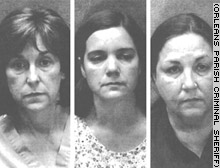Angels Of Death Or Victims Themselves?

Dr. Pou, Nurses Budo and Landry
Four deaths in the aftermath of Hurricane Katrina embody the uncertainty and chaos that reigned in New Orleans during the days of the disaster there. Their deaths leaves huge questions as to who has the most to gain or loose in the days since Katrina.
Questions that come from reading between the lines...
How did an ENT (ear-nose-throat specialist) become a decision maker (and accused life taker) at Memorial Medical Center? Surely, there were better qualified attending doctors in the building (i.e., hospitalists who have a generalized practice scope that would include critical care, instead of a limited specialty area such as the accused ENT) to oversee the care and evacuation of the patients trapped there by the flood.
The purported victims all were located in a specialized unit (a long-term acute care facility - LTAC) that was independently run by an outside medical entity separate from the hospital. The hospital is owned by Tenet Healthcare Corp. of Dallas and the LTAC unit, which was located on the seventh floor of Memorial, was owned by owned and staffed by LifeCare Holdings Inc. of Plano, Texas. The doctor and the two nurses were Tenet employees, not LifeCare employees. Did LifeCare employees think the ENT and the two nurses were not qualified to make decisions regarding their patients because they weren't employed by their own facility? (Second-guessing might come easily then). It makes a person wonder what the historical relationship of LifeCare staff with Tenet staff was like. Could on-going friction between the two create an atmosphere of distrust? Or does it go beyond employee relations?
LifeCare's lawyers alerted investigators on Sept. 14 to the suspicious deaths.(source)What witnesses report happening...
The alleged slayings occurred Sept. 1, the fourth day of the disaster. By that point, according to eyewitness accounts, hospital personnel had begun ferrying some patients with the help of a small fleet of private rescue boats. But it was difficult to move the sickest of them because the elevators didn't work. Bodies filled the chapel as well as the morgue.Refusing orders for sedation? Odd, this word choice. If the ultimate goal of the doctor was euthanasia, one would think other words would come to mind instead of "sedate".
That morning, LifeCare employees approached Susan Mulderick, the incident commander at Memorial, and asked her what the hospital planned to do about evacuating the LifeCare unit's patients. Mulderick said they "were not going to leave any living patients behind." She then told them to find Pou.
In the affidavit, a number of LifeCare employees described Pou's subsequent rounds on the seventh floor, and the help she allegedly received from the nurses.
According to one witness, Pou said "a decision had been made to administer lethal doses" to the nine remaining patients in critical condition on the seventh floor.
Another witness said Pou had determined that their patients would not survive. She also thought they were unconscious. But a LifeCare worker told Pou that one patient, a 380-pound paralyzed man, was "aware, conscious and alive."
Pou, however, determined that the man could not be evacuated. She asked if there was a LifeCare worker who would sedate the man, but a supervisor refused on behalf of the staff.(source)
Another version of decision-making...
Four hospital administrators at Memorial Medical Center heard of plans to give patients lethal doses, although none of the key witnesses said they knew who made the decision, the affidavit said.So which is it, "sedate" or "lethal doses"? Conflicting (and possibly biased) reports... Reason indicates that, although the ENT Dr. Pou and the two nurses may have administered the narcotics to the purported victims, the decision (if there really ever was a decision for euthanasia) was one that was reached by mutual agreement during a meeting of the minds of the upper echelon of the hospital staff and then executed by the three accused. Because LifeCare was a separate entity (a hospital within a hospital) would there have been a meeting without one of their representatives present? Two different sources (Pou and Mulderick) are reported echoing the same plan to not "leave any living patients behind". It is curious that this statement (as vague as it is appears to be) is at the center of this case. The statement could for all intents and purposes be taken two ways; 1) a superhuman effort would be made to get all the patients out, or 2) patients that couldn't be moved would not be left behind alive. So, was an order for euthanasia made by the administrators (again I wonder was LifeCare there?) or did the doctor act on her own to expedite the rescue for the patients and herself from the horrible conditions those trapped at Memorial were dealing with?
During a meeting about the evacuation plan, one hospital administrator who has not been charged told employees they did not expect to evacuate nine critically ill patients.
She also said the plan was they "were not going to leave any living patients behind". (I assume this administrator was Susan Mulderick).
Pou later told a hospital worker that many of the patients on the seventh floor "were probably not going to survive" and that "a decision had been made to administer lethal doses," the affidavit said.(source)
I've got some serious doubts about this witness report...
Budo (one of the nurses accompanying Pou) was observed giving an injection to a 92-year-old man who said, "That burns," as she administered a lethal dose of morphine.I question the credibility of the witness on this testimony. The man obviously had a peripheral intravenous delivery system, by which the injection had been given. If he had any other kind of delivery device he would not have felt a thing. These small IV accesses burn when saline (a solution the human body produces itself) is administered to flush the line. This is not indicative that morphine was present in the injection. This does not sound like a statement given by a nurse (although, I could be wrong), but more like something someone without much, if any, medical knowledge would give (possibly an orderly or a nurses assistant).If this is the type of evidence that the DA will present to prove their case, it is circumstanial bordering on inflammatory at best.
It also is being reported that
Late last month, the troubled hospital company -- which lost more than $3 billion in the last three years -- agreed to a $900-million settlement with the federal government over allegations that it bilked Medicare. (source)One more reason for LifeCare to distance themselves from Tenet. LifeCare attorneys reported this - why were they interviewing employees in the first place unless they were afraid of being placed at fault in the deaths? It comes to my mind that LifeCare, rather than Tenet, would ultimately be responsible for the welfare of the patients in their care. Could it be reason enough to point blame somewhere else?
There is a whole lot more to this story than three individuals acting as angels of death. Who really are the victims now?


posted by Is It Just Me? at 9:54 AM










<< Home